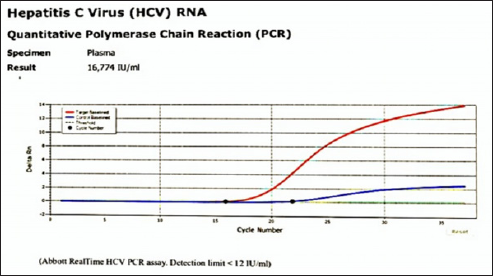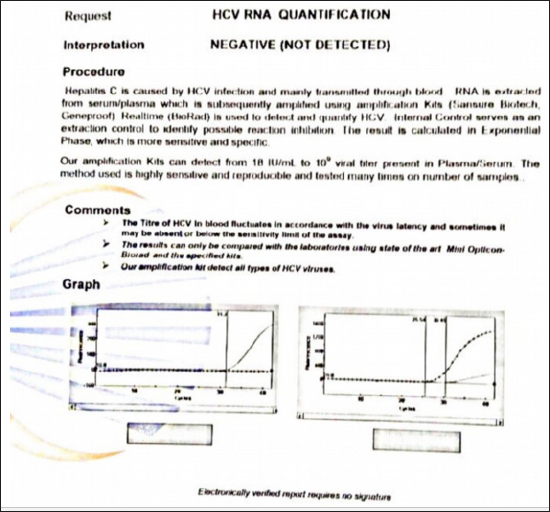Impact Factor : 0.548
- NLM ID: 101723284
- OCoLC: 999826537
- LCCN: 2017202541
Kashif Aziz*1, Mehreen Khan2, Amir Shahbaz1, Muhammad Umair1 and Issac Sachmechi1
Received: September 13, 2018; Published: September 26, 2018;
*Corresponding author: > Kashif Aziz, Department of Medicine, Icahn School of Medicine Mount Sinai, Queens Hospital Center, Jamaica, New York, USA
DOI: 10.26717/BJSTR.2018.09.001792
Aim: Hepatitis treatment with direct acting antivirals improves markers of diabetes like HbA1c and also decreases daily requirement of antidiabetic medications.
Background: Insulin resistance and Type 2 diabetes are one of manifestation of Hepatitis C (HCV). It is proposed that circulating micro ribonucleic acid (miRNA) can do regulatory functions to modulate gene expression in peripheral tissues leading to insulin resistance and diabetes. Clearance of HCV with direct-acting antivirals (DAAs) significantly decreases hemoglobin A1c (HbA1c) and the dependence on anti-glycemic medications.
Case Description: we present a case of HCV positive diabetic patient treated with the combination of sofosbuvir/velpatasvir/voxilaprevir, lead to improvement of his HbA1c as well as significant reduction of his daily insulin dose.
Conclusion: It is concluded that treatment of HCV with DAAs may cause improvement of glucose metabolism and decreases dependence on anti-diabetic medications.
Abbreviations: HbA1c: Hemoglobin A1c; DAAs: Direct Acting Antivirals; HCV: Hepatitis C Virus; miRNA: Micro Ribonucleic Acid; CHC: Chronic Hepatitis C Virus Infection; SOF: Sofosbuvir; LED: Ledipasvir; Low LDL: Density Lipoprotein; SVR: Sustained Virologic Response
Hepatitis C virus (HCV) infection is associated with increased rates of glucose abnormalities, including diabetes mellitus and insulin resistance. The presence of glucose abnormalities in HCV infected patients, including diabetes mellitus and insulin resistance, is associated with negative liver-related outcomes (i.e., severe liver fibrosis, decreased response to antivirals, and increased the occurrence of hepatocellular carcinoma) [1]. It is suggested that circulating micro ribonucleic acid (miRNA) can perform regulatory functions to modulate gene expression in peripheral tissues leading to insulin resistance and diabetes. Once miRNA of HCV cleared by treatment, insulin resistance and glucose metabolism improved [2]. A fixed-dose combination of the hepatitis C virus NS5B polymerase inhibitor sofosbuvir, the HCV NS5A inhibitor velpatasvir and the HCV NS3/4A protease inhibitor voxilaprevir is approved in Europe for the treatment of chronic HCV infection in adults [3]. Here we present a case of HCV patient treated with sofosbuvir/velpatasvir/ voxilaprevir that lead to improvement of his hemoglobin A1c (HbA1c) in addition to a significant reduction of his daily insulin dose.
Hepatitis C virus (HCV) infection is associated with increased rates of glucose abnormalities, including diabetes mellitus and insulin resistance. The presence of glucose abnormalities in HCV infected patients, including diabetes mellitus and insulin resistance, is associated with negative liver-related outcomes (i.e., severe liver fibrosis, decreased response to antivirals, and increased the occurrence of hepatocellular carcinoma) [1]. It is suggested that circulating micro ribonucleic acid (miRNA) can perform regulatory functions to modulate gene expression in peripheral tissues leading to insulin resistance and diabetes. Once miRNA of HCV cleared by treatment, insulin resistance and glucose metabolism improved [2]. A fixed-dose combination of the hepatitis C virus NS5B polymerase inhibitor sofosbuvir, the HCV NS5A inhibitor velpatasvir and the HCV NS3/4A protease inhibitor voxilaprevir is approved in Europe for the treatment of chronic HCV infection in adults [3].
Here we present a case of HCV patient treated with sofosbu- vir/velpatasvir/voxilaprevir that lead to improvement of his he-moglobin A1c (HbA1c) in addition to a significant reduction of his daily insulin dose (Figure 1). He noticed an improvement in his blood sugar levels after the start of HCV treatment. His HbA1c three months prior to treatment was 7.63% and after treatment was 7.17%. Concomitantly he reduced the total intake of his insulin by 20%. Patient completed his treatment for HCV in October 2017 and became seronegative for HCV on PCR after 12 weeks of therapy with sofosbuvir/velpatasvir/voxilaprevir combination. He stopped using his medications for HCV after 12 weeks. His PCR after HCV treatment is given below in Figure 2. His blood sugar levels and HbA1c before and after HCV Treatment are given Table 1. His recent visit to our center was in April 2018 and latest HbA1c was 7.02%. We noticed a significant improvement in his HbA1c from his pre-HCV treatment value. The patient had not made any significant change in his daily physical activity and diet plan from last one year. He also had not noticed any marked change in his weight.
Figure 1: Polymerase chain reaction (PCR) before treatment with sofosbuvir/velpatasvir/voxilaprevir.

Figure 2: Polymerase chain reaction (PCR) after treatment of HCV with sofosbuvir/velpatasvir/voxilaprevir.

Chronic hepatitis C virus infection (CHC) is a long-term illness, associated with extrahepatic manifestations, including Type 2 diabetes mellitus (T2DM) which is an endocrine disorder having multifactorial mechanisms. HCV infection is associated with an increased risk of T2DM independent ofthe severity of the associated liver disease in CHC, and cirrhotic HCV patients. As expected T2DM risk is higher in cirrhotic HCV patients than Chronic Hepatitis C, and the prevalence of HCV infection in T2DM patients is higher than in non-diabetic controls [4]. As we already discussed HCV miRNA role in the development of insulin resistance and diabetes, similarly Antonelli and colleagues [5] also explained the processes through which CHC is associated with T2DM seem to involve direct viral effects, insulin resistance, proinflammatory cytokines, chemokines, and other immune-mediated mechanisms. It is suggested that Clearance of HCV with direct-acting antivirals (DAAs) reported improvements in glucose metabolism and decreases HbA1c, as well as dependence on anti-diabetic medications [5,6].
As in our case patient reduced his dose of insulin by 20% after HCV treatment. Also, as we already mentioned our patient had not made any significant change in his diet plan and daily physical activity during last one year, so we can conclude that improvement in his glucose metabolism is related to HCV eradication. On review of the literature, we found four studies which show improvement in HbA1c and insulin resistance after the treatment of HCV by sofosbuvir with ledipasvir and other DAAs as shown below Table 2. One of these studies also shows decrease dependence on anti- glycemic medication after HCV eradication. Our patient is the first case to be reported which shows improvement in HbA1c, as well as the reduction in daily insulin dose due to HCV treatment with sofosbuvir/velpatasvir/voxilaprevir.
HCV eradication by direct acting antivirals like sofosbuvir/ velpatasvir/voxilaprevir was accompanied by the improvement in HbA1c with reduction of the daily dose of insulin. We conclude that the elimination of miRNA of HCV by direct acting antiviral is one of the reasons for the improvement in the glucose metabolism. Future studies are needed to confirm the association between the glycemic level and HCV eradication by direct acting antivirals.
The authors declare that the procedures were followed according to the regulations established by the Clinical Research and Ethics Committee and to the Helsinki Declaration of the World Medical Association.
The authors declare having followed the protocols in use at their working center regarding patients' data publication.
Obtained.


